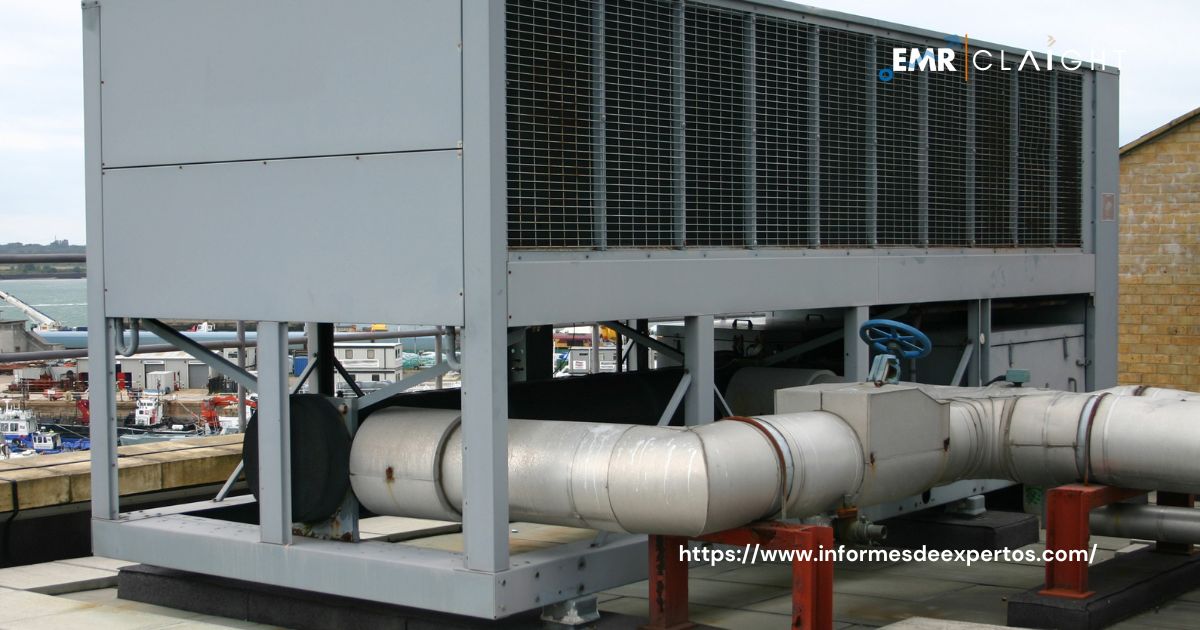The chiller market represents a segment of the refrigeration industry dedicated to the manufacturing, distribution, and utilization of chillers. Chillers are refrigeration systems designed to remove heat from a liquid or vapor through a vapor-compression or absorption refrigeration cycle. These systems are widely used in various industrial, commercial, and residential applications to maintain temperature control, enhance process efficiency, and ensure comfort in indoor environments. The chiller market encompasses a diverse range of products, including air-cooled chillers, water-cooled chillers, absorption chillers, and heat pump chillers, catering to a wide array of cooling requirements across different sectors.
History
The history of chillers can be traced back to the 19th century with the advent of mechanical refrigeration technologies. The development of vapor-compression refrigeration systems by pioneers such as William Thomson and Jacob Perkins laid the foundation for modern chiller technology. Initially used for industrial and commercial refrigeration applications, chillers gradually found their way into various sectors including food processing, pharmaceuticals, healthcare, data centers, and HVAC (Heating, Ventilation, and Air Conditioning) systems.
The evolution of chillers has been marked by advancements in refrigeration technology, materials science, and energy efficiency. In the early 20th century, the introduction of CFCs (chlorofluorocarbons) as refrigerants revolutionized the industry, offering superior performance and stability. However, concerns over ozone depletion and environmental impact led to the phase-out of CFCs in favor of environmentally friendly alternatives such as HFCs (hydrofluorocarbons) and HFOs (hydrofluoroolefins).
Market Dynamics
The chiller market is driven by various factors including industrialization, urbanization, technological advancements, environmental regulations, and energy efficiency mandates. Rapid industrialization and urbanization have led to increased demand for cooling solutions in sectors such as manufacturing, food processing, pharmaceuticals, and data centers. Additionally, the growing emphasis on energy efficiency and environmental sustainability has spurred innovations in chiller design, refrigerants, and control systems.
Technological advancements in compressor technology, heat exchangers, and control systems have led to improvements in chiller performance, reliability, and energy efficiency. Variable-speed drives, digital controls, and advanced monitoring systems enable precise temperature control, optimal energy utilization, and predictive maintenance, resulting in cost savings and operational efficiency for end-users.
The chiller market is also influenced by regulatory requirements and industry standards aimed at reducing greenhouse gas emissions, improving energy efficiency, and promoting the use of environmentally friendly refrigerants. Initiatives such as the Montreal Protocol and the Kigali Amendment have led to the phase-out of ozone-depleting substances and the adoption of low-global-warming-potential (GWP) refrigerants, driving the development and adoption of eco-friendly chillers.
Key Players
The chiller market is highly competitive, with a diverse ecosystem of manufacturers, suppliers, and service providers catering to various segments and applications. Some of the key players in the chiller market include:
- Carrier Global Corporation: A leading provider of HVAC, refrigeration, and building automation systems, Carrier offers a comprehensive range of chiller products and solutions for commercial, industrial, and residential applications.
- Trane Technologies plc: Trane, a subsidiary of Trane Technologies plc, is a global leader in heating, ventilation, air conditioning, and refrigeration (HVAC&R) solutions, offering a wide range of chiller products and services for diverse applications.
- Daikin Industries, Ltd.: Daikin, a Japanese multinational air conditioning manufacturing company, offers a portfolio of chiller products, including air-cooled and water-cooled chillers, for commercial, industrial, and institutional customers worldwide.
- Johnson Controls International plc: Johnson Controls is a global leader in building technologies and solutions, offering a range of chiller products under its YORK brand for commercial and industrial applications.
- Mitsubishi Electric Corporation: Mitsubishi Electric is a Japanese multinational electronics and electrical equipment manufacturing company, offering a range of chiller products and solutions for commercial, industrial, and residential HVAC applications.
Trends and Outlook
The chiller market is poised for continued growth and innovation driven by emerging trends such as energy efficiency, smart technology integration, and sustainability. As organizations seek to reduce energy consumption, operating costs, and environmental impact, the demand for energy-efficient chillers with advanced controls and monitoring capabilities is expected to rise.
Integration of smart technologies such as IoT (Internet of Things), data analytics, and predictive maintenance into chiller systems enables remote monitoring, real-time diagnostics, and proactive maintenance, improving system reliability, performance, and uptime. Additionally, the adoption of modular and scalable chiller designs allows for flexibility, scalability, and easier installation, catering to evolving customer needs and space constraints.
